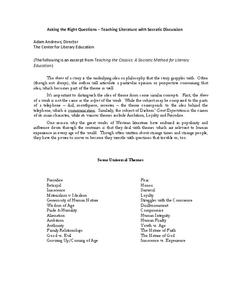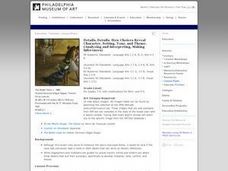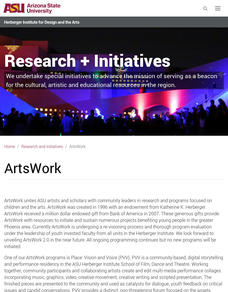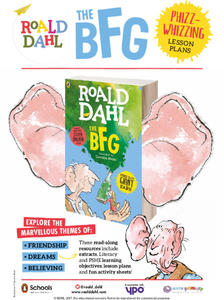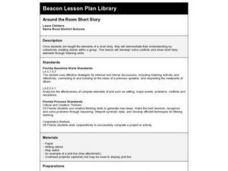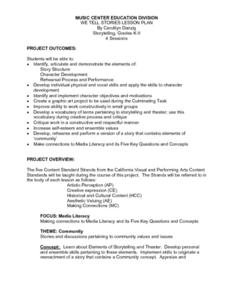Waunakee Community School District
Identifying Themes in Literature
If your language arts learners have a hard time determining the universal theme of a written work, use a straightforward learning exercise to help them find it. After reviewing a list of common themes, kids note the title, character,...
Curated OER
Interpreting Characters, Setting, Plot, and Theme - The Triangle Shirtwaist Factory Disaster
Examine story development and historical disaster with your class. Learners view a video depicting the incidents surrounding The Triangle Shirtwaist Disaster. They use graphic organizers and the Internet to gather enough information to...
Curated OER
Elements of Fiction
The metaphor of a pot of soup and a series of colorful templates remind young writers of the elements that make for a rich story. Pepper the plot with carrot/character, potato/point of view, corn/conflict, tomato/theme, and season with...
Curated OER
Pick A Short Story
Students select a short story and apply various literary elements they have used throughout the year. They deconstruct a short story according to plot, setting, characterization, and theme. Students create a PowerPoint.
District 186 Springfield Public Schools
Tone, Mood, Theme, and Motif
It's all well and good when you're asked to identify a speaker's tone using his or her body language, facial expression, and pitch and emphasis. Identifying the tone of a written passage is another challenge entirely. Check out an...
Curated OER
Teaching "Theme" with Children's Literature
In this exercise, learners examine the difference between a theme, topic, and moral. After a class discussion on the definition of literary themes, the instructor reads The Cello of Mr. O by Jane Cutler. Next, individuals analyze the...
Curated OER
Analyzing the Use of Irony in a Short Story
Ninth graders examine how literature connects to real-life and see how irony aids in the development of theme. They read Shirley Jackson's The Lottery, and discuss elements of foreshadowing and situational irony. Then learners will write...
Writing Educators Symposium
Asking the Right Questions
It can be difficult to find the theme of a book or story if you don't know the questions to ask. Teach your kids to discern the universal theme in works of literature with a set of activities that promote critical thinking and active...
Curated OER
Story Mapping
Help your learners map a story with a graphic organizer provided. Four squares for setting, problem, characters, and solution surround the circle for theme. Use this with any story you may be reading to go over important elements of story.
Curated OER
Express Yourself Lesson Seed 12: Story Event
Focus on plot and the impact-specific events in The Cay. Class members use their double-entry journals, created in a previous lesson in this series, to record their thinking about the guiding question as they read chapters 15 through 17....
Curated OER
Details, Details: How Choices Reveal Character, Setting, Tone, and Theme. (Analyzing and Interpreting, Making Inferences)
Students respond to works of art. For this art interpretation lesson, students examine images of art while using concepts they learned as they read literary pieces. They detail the setting, characters, and the mood and theme of the works...
PB Works
The Short Stories of Ernest Hemingway
There is more going on under the surface of Ernest Hemingway's work than one can glean in an initial reading. A literature resource compares the themes and structures of several of Hemingway's works before prompting class members to use...
Syracuse City School District
Literary Elements
Address the literary elements in a piece of writing using these materials. The packet includes plenty of resources, and focuses mainly on theme, character, and point of view, with some materials for setting, symbolism, and author's...
Curated OER
Creating Plays from Children's Stories
Students explain how individual elements (e.g., plot, theme, character, conflict, etc.) comprise the structure of a play. They write an original one-act play with developed characters, specific setting, conflict, and resolution.
Curated OER
The Study of Theme and Figurative Language in Poetry and/or Prose
Identify and analyze the use of figurative language used in select pieces of writing. These pieces of literature will represent at least two pieces by one writer and at least two pieces by different writers. This instructional activity...
Roald Dahl
The BFG Lesson Plans
A 55-page unit examines the novel, The BFG, by Roald Dahl. Six lessons pay close attention to friendship, dreams, and believing themes while analyzing interesting characters, writing creative vocabulary, smilies, metaphors, an exciting...
Curated OER
Comparing Themes and Plots: "Young Goodman Brown" and "The Minister's Black Veil"
Students read two stories by Nathaniel Hawthorne and write an essay comparing plots and themes. For this Nathaniel Hawthorne short stories lesson, students read "Young Goodman Brown" and "The Minister's Black Veil." After a class...
Curated OER
Around the Room Short Story
Collective story writing is a great way to reinforce the concept of story elements and collaborative learning. Young writers discuss story elements such as, setting, character, action, climax, conclusion, foreshadowing, dialogue, and...
Vanier College
Analyzing Short Stories/Novels
Good questions can help focus readers' attention on the elements writers use to add depth to their stories. The questions on this worksheet do just that and encourage readers to think critically about a story and author's purpose.
Houghton Mifflin Harcourt
Surprise!: Extra Support Lessons (Theme 2)
Surprise! is the theme of a unit covering such topics as consonants, blending, short vowels sounds, high frequency words, and number words. The unit's lessons also include teachable moments covering story structure, illustrations,...
Curated OER
After Reading: "Plot the Plot" Activity in the Library Media Class
"Plot the plot" of "The Adventures of the Speckled Band" with your young readers. Take a few days to read Sir Arthur Conan Doyle's short story as a class or in pairs, having learners write down what they consider to be the most important...
Freeology
Annotations Bookmark
In general, pupils are not allowed to write in school-issued books; however, they can write on a bookmark that you provide! Kids can take notes on the setting, characters, themes, and connections as they read a short story or novel.
Curated OER
Applying Ahimsa to Traditional Stories
Investigate the life of Mahatma Gandhi by researching non-violent lifestyles. Learners define the word ahimsa and discuss the personal characteristics that made Gandhi a peaceful warrior. They also create a poster about the story "The...
Curated OER
We Tell Stories
Young readers bring characters to life by working in small groups to script and perform stories that contain a community concept. Detailed questions and activities are outlined for the class. Consider having your groups create...









